PersonalityDrive
Welcome to PersonalityDrive! Who you are is defined by your personality. Your personality is the combination of attributes or qualities that form your distinctive character.
Click on a heading below and see a summary, and if you're interested you can GO and read more about it
Here are some initial thoughts about personality. GO!
Here are some facts and stats about personality. GO!
The nature versus nurture debate involves whether human behavior is determined by the environment, either prenatal or during a person’s life, or by a person’s genes. GO!
Experts say Personality is inherited and more identifiable whereas character is learned and more difficult to assess. GO!
A person with a personality disorder thinks, feels, behaves or relates to others very differently from the average person. GO!
What are you likely to inherit from your family? GO!
Your personality affects who you’re attracted to and you are most suited to. GO!
Research says there are 4 / 5 / 8 / 16 different personality types, depending on what you read! GO!
Probably the best known set of personality types are from Myers-Briggs. These are used extensively including in recruitment. Find out more below! GO!
Stereotyping was normal – now society’s views on personality are changing rapidly GO!
Some things we learn affect how we behave, how we succeed and ultimately our personality GO!
Are you one of life’s victims, where everything that happens is someone else’s fault, or can you make the most of your (sometimes bad) experiences? GO!
This is about how well we can manage and control our emotions, or more precisely, our emotional reactions. GO!
If you’re a visitor to our site you can join and download information, assess your own health and create your own action plans, and even contribute to our site. GO!
We have some additional information on this subject. GO!
Some Initial Thoughts

What is it?
Personality is one of the most complex area of the body. You cannot touch It, feel it, monitor it, isolate it or treat it, yet it can influence every part of the body positively or negatively.
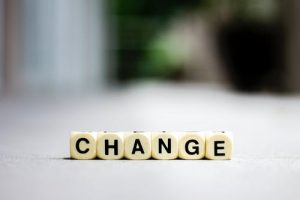
Can it change and what does it affect?
It can change over time and is sensitive to its surroundings. It can become damaged or developed by external circumstances. It influences our match making preferences, our social circles and our wellbeing.

What do we know about it?
There is much written about our personality yet many don’t know their own personality or pay much attention to it until we are emotionally intelligent enough to manage it. We have attempted to take a holistic approach to personality and character.
Facts About Personality
are extraversion, neuroticism, agreeableness, conscientiousness, and openness developed in the 1970s
is based on nationality (2017 study published in the journal PLOS ONE)
experience symptoms of at least one personality disorder (National Institute of Mental Health. Personality disorders. Updated November 2017)
of our personality change as we age (anxiety levels, friendliness, and eagerness for novel experiences) while the rest remain stable (researcher Paul T. Costa Jr)

Personality - nature or nurture?
Part of the answer to your question is that some of your personality comes from your parents. Just as parents pass down physical traits like hair and eye colour to their offspring, they can also give them different personality traits. They’re in your genes, the information passed throughout generations.
But your personality isn’t set in stone from the beginning. There are a few other things that go into it. A significant amount of your personality [up to 50%] comes from parents but the rest is developed via environmental and social influences. Personality is broken down into 5 key areas; openness, conscientiousness, extraversion, agreeableness, and neuroticism.
Studies on heritability of personality have found that between 15 and 55 percent of the overall variance in our personality is due to genetic differences (Power & Pluess, 2015).
One important thing to remember is your personality and character can change over time. As your life experiences develop you do change your behaviour. Also, it is fair to say that if you have 2 parents who are very different you may possess strong traits of one parent at an earlier age and as you gain more life experience the other parents traits would come to the surface.
So, whilst there are personality traits tests and there is a huge amount of information on personality types you have to take a holistic view, taking into account DNA and inherited traits, lifestyle changes, your attitude and characteristics such as Locus of Control elements, Mood types and lifestyle situation.
Experience shows that you can take these tests at different stages in your life and when your circumstances and environment are influencing your thought process your choices may be different. Also, as you get older your life experience does make you look at life differently.
So a simple example is: what is your attitude and desire to change? Firstly, look at your family history: can they demonstrate a high level of personal change or are they quite traditional and don’t like change. These traits often pass down to the next generation.
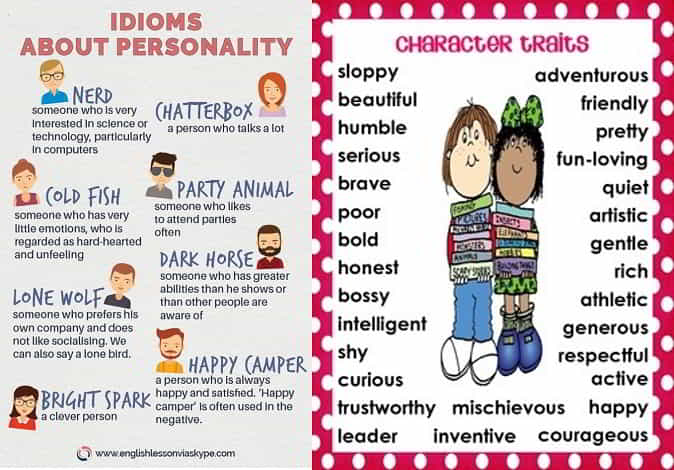
Personality versus character
What is the difference between personality and character? Well, the experts say personality is inherited and more identifiable whereas character is learned and more difficult to assess. This is quite contradictory because experts equally say only up to 50% of personality is inherited and the rest is learned through life. Either way it doesn’t really matter. It’s better to say personality and character are equally important when considering a holistic review of yourself.
Click on any of the tabs to the right to see more information on that subject
The Cambridge English Dictionary has the following definitions and examples:
Definition of Personality
the qualities that make one person different from another:
- She’s got a lovely, warm personality.
(it also says: ‘a famous person’, but we’re not going there!)
Definition of Character
the particular combination of qualities in a person or place that makes them different from others:
- Politeness is traditionally part of the British character.
- It would be very out of character (= not typical) of her to lie.
- One of the joys of being a parent is watching the child’s character develop.
- The idea was to modernize various aspects of the house without changing it essential character.
- It’s not in his character to be (= he is not usually) jealous.
It also says:
qualities that are interesting and unusual:
- a hotel of character
the quality of being determined and able to deal with difficult situations:
- She has such strength of character.
This chart shows how personality differs from character in some key areas.

The significant differences between personality and character are discussed in the following points:
- Personality refers to the combination of qualities, attitude and behaviour, that makes a person distinct from others. Character refers to a set of moral and mental qualities and beliefs, that makes a person different from others.
- Personality implies Who we seem to be? On the other hand, the character represents who we actually are?
- Personality is a set of personal qualities whereas character is a collection of mental and moral characteristics of an individual.
- The personality is the mask or the identity of a person. Conversely, the character is the learned behaviour.
- Personality is subjective, but the character is objective.
- Personality is the outer appearance and behaviour of a person. At the same time, character indicates the traits of a person which are hidden from sight.
- The personality of an individual may change with time. However, the character lasts longer.
- Character requires validation and support of society. In contrast, the personality, does not need validation and support of the society.
After reviewing the above points, it is clear that personality is different from a character in a sense that personality reflects the outer shell, whereas the character, shows the inner self. If you combine your personality and your character, the result will be who you are in reality.

Personality Disorders
Or are they?
Sometimes in this modern-day world we want to label people or give every condition a label. I wonder if this is for professionals or for the general public who can tell others: Sorry for my behaviour I have XXXXXX ism and cannot help it.
Another important observation to make is all extreme types of anything can have an adverse effect on individuals or others. It is the word extreme that counts here. If you read some of the definitions below of what experts called disorders you could say everyone on the planet has some of these attributes some could even be seen as useful or positive.
Narcissism is a great example and is often used today to criticise others for what could be perceived as holding an opinion of a subject. People often use these labels nowadays in a negative way calling a person a narcissist just for holding a view/belief/attitude/ behaviour that is polarised to theirs. You will see below the extreme versions of personality disorder. But we would suggest you temper the extreme and look at the words and in a positive context, see there are some traits that are positively beneficial.
Another well-worn word in 2020 is misogynistic. Again, it seems this word is bandied around by people who label others misogynistic when they hold a different opinion. The word Misogyny conventionally means hatred of women, was once a radical accusation. But in recent time, it seems to have eclipsed the gentler “sexism” and “chauvinism” in popular use. So, the original word was to hate women and this has now been hijacked and turned into a broader description and quite frankly anyone could make a sexist or chauvinistic statement because it is often the listener who determines whether it is or not. Again, modern behaviour is to reel off a list of describing words aimed at someone who holds a different view. In a free world is a person not allowed to hold their own personal views?
The opposite of a narcissist is an ’empath’. People who are very receptive to the emotions of others are known as empaths. Because they are also sensitive to noise, smell, and being around people, they are likely to feel overwhelmed in crowds and exhausted in social situations. Empaths sometimes struggle with daily life. They pick up on negative emotions from other people and actually absorb those feelings onto themselves.
The reality is the world is made up of all different types, shapes, views, beliefs, attitudes, behaviours. It makes the world go around and be a varied place. Everyone has a role to play. Too many of one type can be damaging for society.
The Three Groups of Personality Disorders [medical generic journal definitions]
Professionals consider someone to have a personality disorder if their symptoms significantly impair their relationships with themselves and others. Furthermore, these issues must be the result of pathological traits and remain consistent throughout different situations. However, their personality disorder symptoms cannot be due to normal developmental behaviours or the influence of substances.
There are 10 different personality disorders, each with different symptoms. Professionals sort these disorders into three clusters: A, B, and C. The disorders within these clusters make patients think and behave in similar ways.
You can check out various aspects of this by selecting any of the tabs below.
Click on any of the tabs to the right to see more information on that subject
Group A disorders have symptoms that others see as bizarre. Sometimes, even strangers can notice these symptoms in people with Group A disorders.
NOTE: extreme behavioural traits need professional help, but the statement says OTHERS see as bizarre. Who says ?? Just because someone does not own a TV and someone else watches TV 15 hours a day who is bizarre? Someone who thinks trees are alive and are more than just a lump of wood and even sense their aura as opposed to the person who religiously attends a football match and supports a team even to the point where they would fight another football club member, which is bizarre?
The disorders in this Group are:
Schizoid Personality Disorder
People with this disorder feel little to no desire to have relationships with others, including sexual relationships, friendships, or close relationships with family. These patients find it hard to notice social cues, express emotions, or find joy in activities.
NOTE: take the extreme out and how many people could behave like this especially introverted people who prefer animals to people. Perfectly normal really.
Schizotypal Personality Disorder
Others often notice that people with this disorder have strange ways of dressing, behaving, and speaking. They may hear voices, believe that everyday things leave hidden messages for them, and believe their thoughts are magical. People with schizotypal personality disorder are often suspicious of others and have trouble forming relationships.
NOTE: extreme removed, what’s wrong with being different and thinking life has a hidden path for us: Destiny. Some would argue being a little more suspicious of others is a good thing. In 2020 divorce is running at 48% and the average relationship lasts 5 years. Therefore it’s normal.
Paranoid Personality Disorder
This disorder causes people to feel constantly suspicious of others without real reasons to feel this way. They believe that the people around them are somehow working against them. Due to this paranoia, they may resist forming meaningful relationships, opening up to others, or forgiving perceived slights.
NOTE: Extreme removed, how many people are suspicious of others, feel they sense something is amiss? In some instances humans do gang up and you’re not part of a clique for a reason. Forgiving is something that humans are not good at. So again, it could be normal human behaviour.
People with Group B personality disorders display behaviours that are overly dramatic and difficult to predict. Their symptoms make it difficult for them to create or maintain relationships. The disorders in Group B are histrionic, borderline, narcissistic, and antisocial.
Histrionic Personality Disorder
Like all group B personality disorders, this condition cause patients to have dramatic, unpredictable outbursts. However, the hallmark of histrionic personality disorder is that people have these episodes as a way to gain attention. People with this disorder may also feel like their relationships are intense, even when the other person believes the relationship is shallow. Their emotions shift rapidly and dramatically, and the people around them greatly influence their behaviours.
NOTE: Childlike behaviour is described above and often people even in middle age lack emotional intelligence; A well-known former president demonstrated this behaviour when confronted with opposition by immediately responding with an outburst demonising their opponent.
Borderline Personality Disorder
People with borderline personality disorder are driven by an overwhelming fear of being abandoned. This often leads to signs like impulse behaviours, including gambling, unsafe sex, and binge eating. They often have fragile self-worth and unstable relationships. When interpersonal conflict is high, people with borderline personality disorder have paranoia and outbursts of anger.
Narcissistic Personality Disorder
This disorder makes people believe that they are more important than others. As such, they may disregard or even fail to notice the needs of others. People with narcissistic personality disorder expect constant praise from those around them and may exaggerate their credentials. They may fantasize about holding more power and envy those with higher statuses. People describe them as arrogant.
NOTE: Is this a disorder or could we say in a mild form half the population have these tendencies? Extreme aside, is it a disorder or just plain human behaviour? Leaders and heads of government are often like this. One could say they are doers in the mix and others are followers. We need all types of personalities to make this world go around.
Antisocial Personality Disorder
Media portrayals and casual conversations often use the term “sociopath,” to describe people with this condition. One of the hallmark symptoms of antisocial personality disorder is the inability to care about other people’s needs and feelings. This leads people with this disorder to violate people’s rights, steal, cheat, and con others. They often have trouble with the law and can act violently. People with this disorder feel little to no remorse for their actions because they cannot understand how they hurt someone else.
NOTE: extreme out, in life there are people like carers, nurses, doctors, vets, social workers and support staff. They do an incredible job. But there are others who are in the middle and exhibit both unselfish and selfish behaviour and then there is the opposite end of the scale. Are humans inherently selfish creatures? Look at how humans treat animals, often as possessions with little or no regard for them. Should we castigate the people who don’t care as being sociopaths and the ones who do care as showing normal behaviour?
Group C personality disorders cause interpersonal friction due to the person’s inability to face certain fears. The conditions in this cluster are:
Obsessive-compulsive Personality Disorder
People with this disorder fear that if they do not carry out certain tasks or stick to rigid rules, something horrific will happen. As such, they obsess over orderliness, rules, and cleanliness. This inflexibility can hurt their relationships.
NOTE: Extreme out, is this yet again just human behaviour and there are all types in life. Some are laissez-faire and some are disciplined rule makers. We do not seem to have a personality disorder for someone who doesn’t obey rules or stick to deadlines, is dirty or is totally flexible to the point it effects their relationship.
Dependent Personality Disorder
The fear of having to take care of oneself guides people with this condition. They rely on others to make decisions for them and take care of all their needs. As such, people with this disorder are at risk for being abused and staying in those situations, even when they have options for leaving.
NOTE: Extreme out, this has to be 85% of the human population and human behaviour. There are people in this world who drive and those who follow. We should always be aware that abuse does take place. But is it abuse? In extreme cases if someone is hurt yes, but how many couples have a leader and a follower and the follower is happy to follow and the leader happy to lead. In business you need a mix of characters as you do in a group or family setting.
Avoidant Personality Disorder
People with this disorder are afraid of any criticism or rejection. In order to avoid these experiences, they may go to extreme measures to avoid contacting people at work or attending social events.
NOTE: Extreme out, all humans hate criticism and rejection it is a human trait. If we have low self-esteem and we are introverted left unchecked this could result in depression and a retreat from society. Extrovert people equally become paranoid and this leads to anxiety.
In our experience of life coaching people, we find people love labels and often come to us with: “I am suffering from this, I have read about it.” When in reality they are just human beings and they need to learn to take control over that specific element of their lives. Often, they overreact to the issue and this makes it worse. If people accepted that nobody is perfect and we all have life issues, it would make it easier to solve. Yes, extreme behaviour needs professional support.
We often also believe that the mental health industry professionals who make money from this life situation peddle these extreme phobias because they have a vested interest, they make money from it.

Personality and Family DNA
We said earlier personality and character come from the parents and learned life experience. Also, and importantly in the early years before birth up to 5, there are things we develop during the growing stages whilst in our mother’s body and during the breast-feeding years that mould our character.
A note of caution should always be applied to evidence and research in that it’s not always black and white and what is said as hard fact in data can be shown to be incorrect in reality especially where personality and character are concerned. it’s like horoscopes not all Taurean’s for example are bullish and stubborn.
Quick Genetics Refresher:
You have 46 chromosomes and they are in a specific equation made up of 23 pairs. These pairs are called DNA and is made up of four letters: T, C, G, and A. It looks like a twisted ladder with one side given by your dad and the other side given by your mom. The very last pair (pair 23) is the sex chromosome and it can be XX or XY. Other chromosomes can have mutations that are expressed as various conditions like Down's syndrome, sickle cell disease, or Fragile X syndrome.
Here are some traits we can pick up from our mother:
Sleeping Style, Hair Colour, Hair Texture, Temper, Healthy Eating Habits, Dominant Hands, Migraines
Intelligence.
A new study shows that because intelligence is carried over into the baby with two X chromosomes from the mother and one from the father, this could have an effect on the baby’s level of intelligence. A second study showed that despite education, race and socio-economic class, the IQ level of the mother could be a good indicator for that of a baby.
What you might pick up from your father:
Height, Dental Health, Dimples, Toes, Fingerprint, Mental Disorders, Handedness
You’re more likely to share your dominant hand with your father over your mother if one is left-handed and one is right-handed.
All jokes aside, nature was designed specifically to create varying equations resulting in varying humans. This is yet another beautiful reminder to never judge other people– especially people you know nothing about. You never know what is going on in their world–literally and genetically. We are all very complex individuals and the way we are wired is unique to each individual.
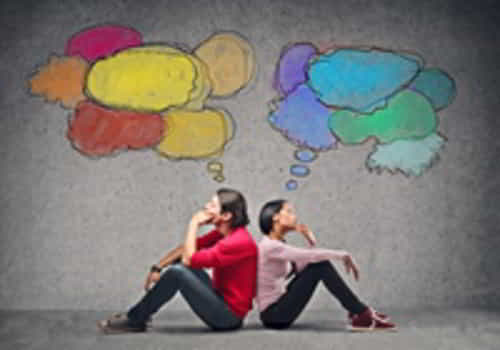
Personality and Relationships
Most of us are allured by the attractive notion that effortless relationships exist. Whether it be happily-ever-after marriages, or friendships that last forever, or parent/child bonds which supersede the need to understand each other, we'd all like to believe that our most intimate relationships are unconditional, and strong enough to withstand whatever may come. However, at some point in our lives most of us need to face the fact that relationships require effort to keep them strong and positive, and that even wonderful, strong relationships can be destroyed by neglect.
Whether you're looking to improve a love relationship, familial relationships, friendships, or employer/employee relationship, understanding your own personality type and the personality type of the other person involved in the relationship will bring a new dynamic to the situation, which will allow better understanding and communication.
Who are we attracted to and why?
Although the different types of relationships have very different characteristics and specific needs, there are two basic areas which seem to be critical in all relationships: Expectations and Communication. What do we expect from ourselves and the other person involved in the relationship? How do we communicate these expectations, and our feelings and opinions to the person in the relationship? How does our personality type affect our expectations and methods of communication? Does our personality type affect who we are romantically attracted to? How does it affect who our friends are, and who we work with best? These are the questions which we address in this section of The Personality Page.
When choosing a partner everyone has a subconscious shopping list, or not. Perhaps that’s why the divorce rate is so high because our shopping list is too short or we completely disregard our preferences and focus on external looks.
For sure the older you get and the more relationships you have the longer your list tends to be, but there is always compromise. Many people often leap into a relationship without really knowing the partner and never stop to think of the veneer.
You can check out various aspects of this by selecting any of the tabs below.
Click on any of the tabs to the right to see more information on that subject
Humans are driven to put on an act and particularly in a relationship, to put on the veneer to make a good impression. Some ask: “How long does it take before the veneer comes away and you see the real person?”. The answer varies from weeks to years.
This can often happen with lifestyles: some people meet another person and prefer their lifestyle to their own and they may spend years living in the shadow of their partner. It could be years before someone finally starts to lower the guard and reveal the real them.
Knowing yourself first is a good start to determine what type of partner you’re looking for. Knowing your personality, character, ILOC or ELO, cup half full versus half empty, personal changeability and vision versus remaining stable and shying away from change. Then likes and dislikes, chemistry and magnetism. Don’t confuse magnetism with lust and desire. The latter often diminishes over time.
That old concept and expression “opposites attract” has been batted around for centuries. And in fact, it’s very true when it comes to love relationships. Through our research, we have noted that people are usually attracted to their opposite on the Extraversion/Introversion and Judging/Perceiving scales. We are naturally attracted to individuals who are different from ourselves – and therefore somewhat exciting.
But it’s not just the exciting differences which attract us to our opposites, it is also a natural quest for completion. We naturally are drawn towards individuals who have strengths which we are missing. When two opposites function as a couple, they become a more well-rounded, functioning unit. There is also the theory that our natural attraction to our opposites is a subconscious way of forcing us to deal with the weaker aspects of our own nature.
While we are highly attracted to our opposites, two opposites involved in an intimate relationship have significant issues and communication barriers to overcome. So in a sense, our attraction to the opposite personality can be seen as our subconscious minds driving us towards becoming a more complete individual, by causing us to face the areas in life which are most difficult to us.
The same cannot be said for other kinds of relationships. When it comes to work colleagues, or friends, we are not especially interested in dealing with people who are very unlike ourselves. We are most comfortable with those who have similar interests and perspectives, and we do not show a lot of motivation or patience for dealing with our opposites.
Although we are attracted to people who are very different from us in the way we deal with the world, we are most attracted to others who have a similar focus in their lives. Couples who have the same dominant function in their personalities seems to have the longest and happiest relationships. So, for example, an individual whose dominant function is Introverted Sensing (ISTJ or ISFJ) seems to be naturally drawn towards partners with a dominant function of Extraverted Sensing (ESTP or ESFP). See next section for personality types.
We have also noticed that Sensors seem to communicate best with other Sensors, and that Intuitive seem to communicate best with other Intuitive. There seems to be a more equal partnership formed with people who communicate on the same level, although there are many successful relationships between Sensors and Intuitive. Two individuals of any type who are well-developed and balanced can communicate effectively and make a relationship work, but many people will communicate best with people who share their same information gathering preference.
With that in mind, it shouldn’t come as any surprise to learn that research regarding Personality Type and Relationships shows a definite pattern which indicates that successful mates often share the same dominant function, and the same letter preference (“S” or “N”) for their information gathering function. Of course, that does not mean that people with different preferences cannot have a happy, successful marriage, it simply indicates that people frequently settle down with individuals who are on their same “wave-length”.

Personality Types - OCEAN or Big 5
Personality tests are beloved by high school guidance counselors and self-help book authors — but less so by many scientists. There’s controversy among them over whether clear-cut personality types exist at all.
A large new study published in Nature Human Behavior, however, provides evidence for the existence of at least four personality types: average, reserved, self-centered and role model. Each one is based on the extent to which people display five different major character traits, including neuroticism, extraversion, openness, agreeableness and conscientiousness.
“It seemed like personality traits were very well-accepted and established in psychometrics, but personality types were not,” says study co-author Luis Amaral, a professor of chemical and biological engineering at Northwestern University. “I just wondered, could it be that the reason why people haven’t been able to establish personality types was there wasn’t enough data?”
However, there are many different views on the 4, 5, 12, 16 or whatever number personality types there are.
One concept is the 'Big Five' personality categories, which are Openness, Conscientiousness, Extraversion, Agreeableness and Neuroticism (hence this is often referred to as 'Ocean'. This is what our personality test calculates.
Another is Myers-Briggs, which we show below the OCEAN model.
You can take the test by clicking the tab on the right, and see the scores mean by clicking the other tab
Se the infographic showing what the types are.
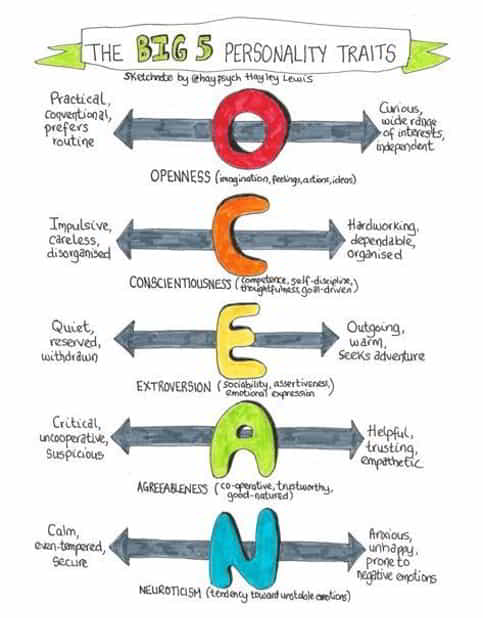
We have a personality test based on the OCEAN personality theory which you take by clicking the link – it will open in a new tab,
See below what low and high scores indicate.

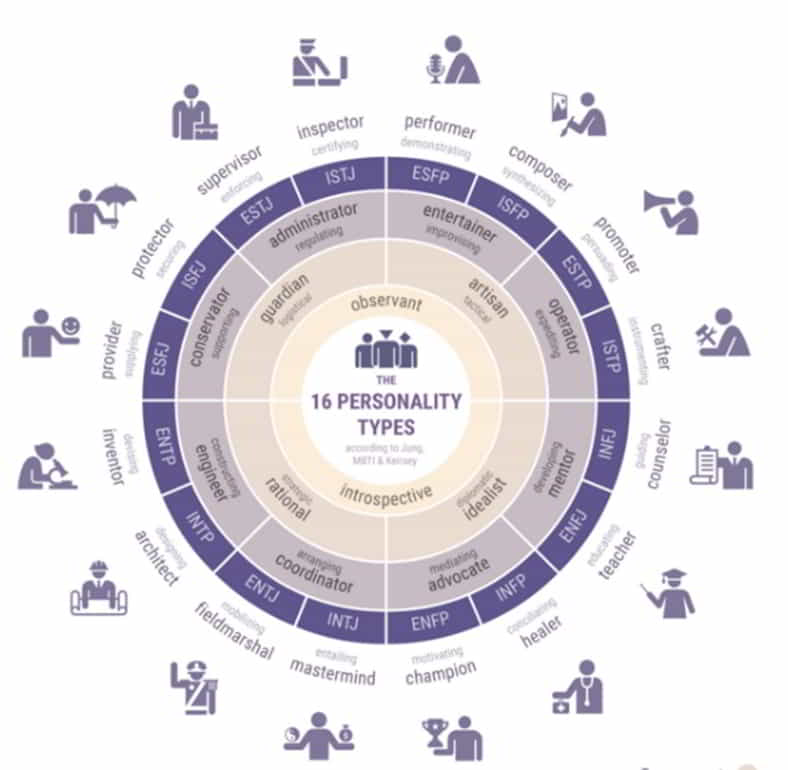
Personality Types - Myers-Briggs
The MBTI measures four things.Outlooks: extraversion / introversionThe first is extraversion (E) and introversion (I). Extraverts are people who get energy from the outside world. Extraverts like to spend their time with other people. Introverts are people who get energy from the inside world. Introverts tend to get energy from thinking and reflecting.Information gathering: sensing / intuitionThe second measure is sensing (S) and intuition (N). Sensing and intuition are ways of gathering information. People who are sensing trust facts. Sensing people accept things if they can see, hear, touch, taste, or smell them. People who tend to like intuition are more likely to accept outcomes based on other people and meanings that cannot be tested.Decision making: thinking / feelingThe third measure is thinking (T) and feeling (F). Thinking and feeling are ways that people make decisions. Those who prefer thinking tend to make decisions alone. They heavily weigh reason, good sense, order, and cause and effect. Those who prefer feeling are more likely to think of the effect that a decision may have on other people. They tend to try to gain balance and agreement with everyone that is involved.Those who prefer thinking do not “think better” than those who prefer Feeling, and those who prefer feeling do not make decisions based only on people.Dealing with others: judging / perceivingThe last measure is of judging (J) and perceiving (P). Judging and perceiving detail how people deal with the outside world. A person who likes Judging tends to report that they use Thinking or feeling to deal with the outside world. A person who likes perceiving tends to report that they use sensing or intuition to deal with the outside world.Simple Wiki16Personalitites have a good description of the types here
This is possibly the best known categorisation of personality types, where the four categories are introversion/extraversion, sensing/intuition, thinking/feeling, judging/perceiving. Each person is said to have one preferred quality from each category, producing 16 unique types. See the wheel below showing the options. Click the link below to take a version of the test online. Then note your type and see what it means below.
While the official, MBTI-branded version of the test is paid, there is a free version available that many people find to be just as helpful: the 16 Personality Types test
The Myers–Briggs Type Indicator is an introspective self-report questionnaire indicating differing psychological preferences in how people perceive the world and make decisions. The test attempts to assign four categories: introversion or extraversion, sensing or intuition, thinking or feeling, judging or perceiving.(Wikipedia)
You can see the specific personality types in the tab on the right, with links to more information on each type. You can see a video in the next tab showing what types are compatible. The final tab sets out the cognitive functions for each type.
Myers Briggs (MBTI) Personality Types
To learn more about Personality and Relationships with regards to a specific personality type, click on the name of the type you’d like to read about. Our thanks to verywellmind for the links.
- ISTJ – The Inspector
- ISTP – The Crafter
- ISFJ – The Protector
- ISFP – The Artist
- INFJ – The Advocate
- INFP – The Mediator
- INTJ – The Architect
- INTP – The Thinker
- ESTP – The Persuader
- ESTJ – The Director
- ESFP – The Performer
- ESFJ – The Caregiver
- ENFP – The Champion
- ENFJ – The Giver
- ENTP – The Debater
- ENTJ – The Commander
This video shows the most compatible Myers Briggs Personality Types
A diagram depicting the cognitive functions of each type: A type’s background color represents its dominant function and its text color represents its auxiliary function.

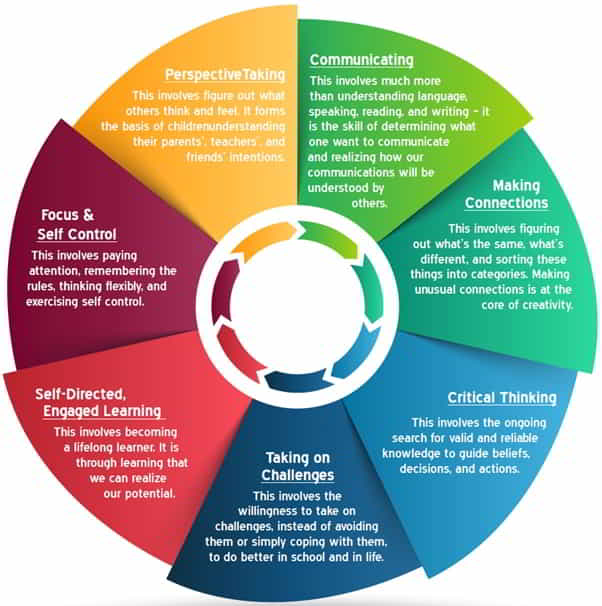
Society expectation - It’s all in the DNA
For decades society has stereotyped men's and women's roles, behaviour, beliefs and attitudes. Since the 1900s society has seen two world wars and many localised wars between communities, countries, cultures, religions and homelands. This has created a state of society of depression, uncertainty, famine, unemployment, death and disease.
As each decade has come and gone the humans born in that decade are wired slightly differently. Scientific research shows us children born between the two world wars had DNA suitable for those times; maturing faster, more resilient etc. As each decade comes along and the social environment improves, e.g. disease is less and there is little famine or starvation, then the DNA is adjusted to the fact that humans have a different set of drivers, worries and concerns.
If we look to western society from the 70s there was a “feel-good factor status” with humans’ environment not suffering from war, famine, disease etc. There was a social safety net and NHS service created, the emergence of equality and society had an element of calm. Therefore, the offspring DNA produced during this period was very different from that produced in the 20s and 40s.
Society also played its part in moulding views, education, beliefs and respects. Millennials have been classified negatively as snowflakes. It is fair to say it’s not their fault they are a product of a more liberalised society and a feel-good factor environment, where they really want for nothing and all their basic needs are met. A young person in the 40s worried about survival and starvation as opposed to a young person of 2020 who worries about negative comments made about their hairstyle on social media.
From the 70s to the millennial society, if we look at stereotypical behaviour between men and women the imagery comes through of men being breadwinners and women being nest makers. WW2 changed a lot of that as women did the same work as men and the 60s saw changes in equality rights. But deep down, even in 2020 there are many men who take on the mantle of being the breadwinner, and when things go wrong the modern male does not always cope well.
Personality and character can change with time and maturity
As we age, we become more consciously competent and this effects our personality and character. It can also develop personality anomalies and disorders. There are 4 well known learning stages in life that are detailed below. But we would like to build upon this concept to extend it beyond just education and skill. This is about life learning as well. In the Buddhist philosophy Buddha often refers to the path of enlightenment, this is in a way similar to conscious competence and emotional intelligence. The more learning and understanding we seek the wiser we become and the more fulfilled we are.
Suicide rates in the UK are highest amongst men between 40 to 49 according to the Samaritans.
A worrying trend developing over the last 10 years is a steady increase in young people suicides under 25. There is some evidence based around this but in many instances middle aged men are finding it hard to deal with life and the pressure that brings. Governments do need to act. In a similar way young people are struggling to cope with life issues.
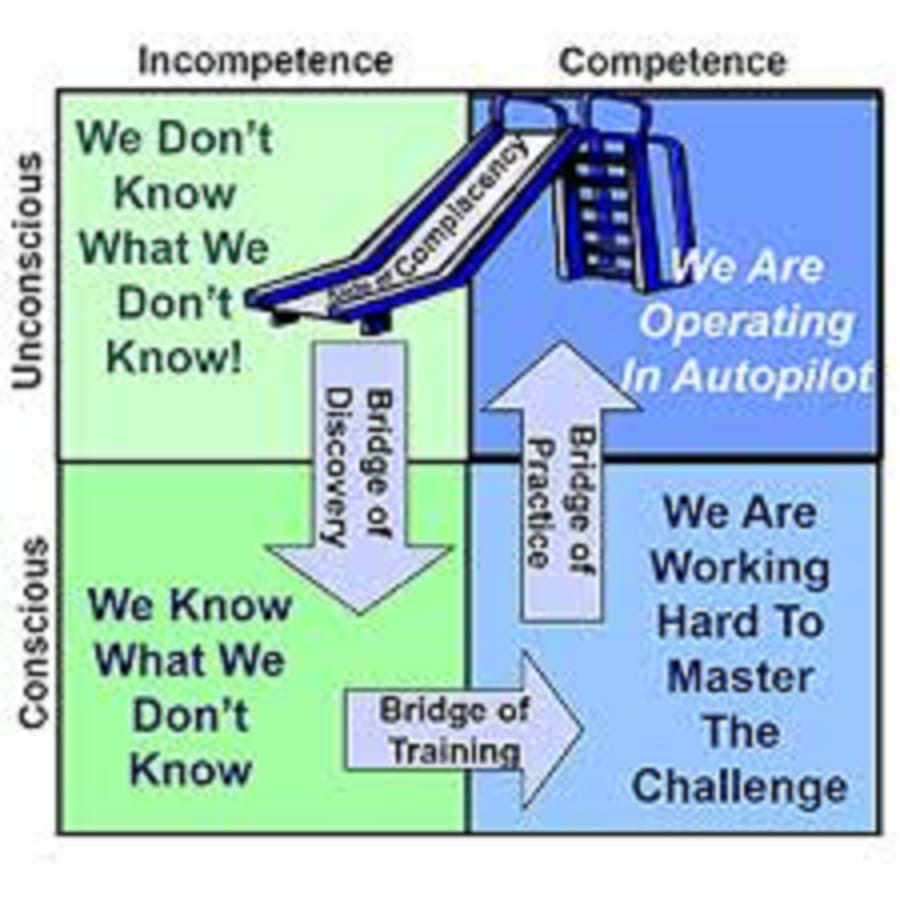
Life Learning - the four stage journey
Unconscious incompetence
The individual does not understand or know how to do something and does not necessarily recognize the deficit. They may deny the usefulness of the skill. The individual must recognize their own incompetence, and the value of the new skill, before moving on to the next stage. The length of time an individual spends in this stage depends on the strength of the stimulus to learn.
Conscious incompetence
Though the individual does not understand or know how to do something, they recognize the deficit, as well as the value of a new skill in addressing the deficit. The making of mistakes can be integral to the learning process at this stage.
Conscious competence
The individual understands or knows how to do something. However, demonstrating the skill or knowledge requires concentration. It may be broken down into steps, and there is heavy conscious involvement in executing the new skill.
Unconscious competence
The individual has had so much practice with a skill that it has become "second nature" and can be performed easily. As a result, the skill can be performed while executing another task. The individual may be able to teach it to others, depending upon how and when it was learned.
In more recent times academics have developed a 5th stage called reflective competence with the ability to look back and around and learn from the experience and pass onto others.
Are knowledge and wisdom personality changers?
A most sought-after question is:”Does wisdom come with age?” Well, the answer is: absolutely not. Knowledge and constant learning bring wisdom.
According to an adult learning organisation 2018 survey more than 50% of the adult population of the UK have a numerical capacity of an 11-year-old child and less than 15% of adults do self-learning after they leave mainstream education other than job related learning.
Medical research has shown that learned knowledge can have an impact on an individual’s personality and character. For example, if a person has held a long-established belief and that belief changes as a result of education, knowledge, wisdom and current mental thought process then a shift in personality or character can take place resulting in a permanent change in behaviour.
How do you define wisdom?
Aristotle believed in two types of wisdom: theoretical and practical. The former involves the exploration of things we can’t change, but about which we seek truth. The latter explores that which we can change through making good choices (Lacewing, n.d.).
Descartes’s viewed wisdom as good judgment in everyday life and seeking knowledge in all things one is able (Rutherford, 2017).
Confucius said:
By three methods we may learn wisdom: First, by reflection, which is noblest; Second, by imitation, which is easiest; and third by experience, which is the bitterest.
Drop by drop is the water pot filled. Likewise, the wise man, gathering it little by little, fills himself with good.
The Buddha

What is your Locus of Control?
Locus of control is a psychological concept that refers to how strongly people believe they have control over the situations and experiences that affect their lives.
Within psychology, Locus of Control is considered to be an important aspect of personality. The concept was developed originally by Julian Rotter in the 1950s (Rotter, 1966). Locus of Control refers to an individual's perception about the underlying main causes of events in his/her life.
Taking personal responsibility
People look at things differently. Some people believe things happen to them, while others believe they can influence what happens to them. Technically this is called the ‘locus of control’. People can have an Internal or external Locus of Control:
Internal
More likely to take responsibility for actions
Tend to be less influenced by others
.
External
Blame outside forces for what happens
Don’t believe they can change their situation themselves
.
People tend to take more responsibility (locus gets more internal) as they get older. However, external isn’t always bad – for example if you are physically unable to do some things you can accept it and focus on the things you can do. The American video shown via the link below explains the concept and gives examples of how this can affect relationships.
Can you change your locus of control?
The good news is that while your upbringing shapes your locus of control, it is possible to change it and become more internal than external. See the video for more info.
How do you improve locus of control?
Focus on what you can control. Ask yourself: “What do I want from my life?” Next make two separate lists. Looking at your steps, note what you have control over and what you don’t. Then reflect on your strengths. Create a plan for how you’ll use your strengths to address the steps you have control over.
How do you see things?
If you want to find out how you see things, you can take a test to show what your locus of control is. Most of the tests are based on work by Rotter dating back to 1966 – many have been updated since.
My Personality Test have a 10 minute test which gives you a summary.
We have a test on our site – click the button below to open tabs – the first contains the test and the second has some information on what it means. To close the tabs hit the X in the top corner.
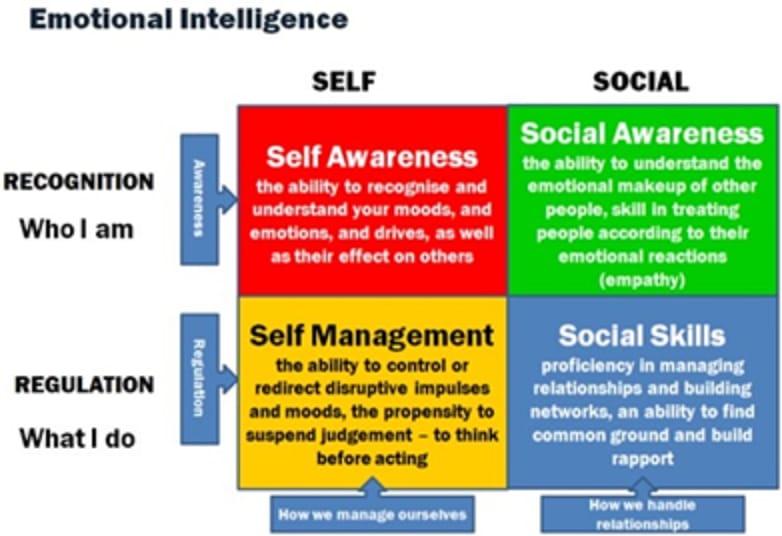
What is Emotional Intelligence?
Emotional Control .
Emotional control, or emotional regulation, is about how well we can manage and control our emotions, or more precisely, our emotional reactions. It's about learning to stay calm when handling small problems, and reacting with just the right amount of emotional reaction given the situation..
Emotional Intelligence
There are extremes of emotional intelligence; some people who have high and low levels, and each has positive and negative traits. Lots of research seems to indicate that with high emotional intelligent there are lots of positive traits and no negative traits, and low emotional intelligence is negative. In real life there are people with high levels of emotional intelligence who can be extremely bossy and impatient, and there are people with low levels of emotional intelligence who are very collaborative and have a very caring and patient nature.
Does it help?
Learning about you and how to manage your emotions in turn helps you with the way you deal with other situations. But having said that a highly skilled emotionally intelligent person can lose their temper or become aggressive in exactly the same way as a low emotionally intelligent person. It really boils down to what temperament and character you have as well.
Do we get more emotional control as we get older?
Not necessarily, you would like to think so but as most adults stop purposeful learning after leaving school it’s not guaranteed.
Characteristics of Emotional Intelligence
Five elements of Emotional Intelligence were identified by psychologist David Coleman:
- Self-awareness
- Self-regulation
- Motivation
- Empathy
- Social skills
How emotionally intelligent are you?
Not sure how long this test will be available for, but there’s a test on MindTools which you can take to see how emotionally intelligent you are and give you some pointers.
How to improve emotional intelligence
Emotional intelligence is about taking charge of our brain and thinking. It’s the same as taking up a physical fitness programme at the gym. Look how people often turn their flab into a toned muscular body and develop a regime of control over their body, what they eat, when they eat etc. They take charge of their bodies. Emotional intelligence is the mental gym.
Can someone help?
People are often looking for quick fix solutions to the mental health situations and it’s just not that easy. There isn’t a magic pill or formula. Many people allow their brain to control their emotions and thinking, but importantly won’t put the effort in to fix the matter.
Life coaches can help people take the first step, which may even be recognising a problem for what it is.
For visitors
Why don't you join us?
You can register to join us as a member, when you’ll be able to download our stuff and comment, or as a YouDriver when you’ll also be able to check your health and set up your own action plans to make some improvements. If you’ve already registered, sign in below. Or let us know what you think.
Myers Briggs Test

Next Steps
It doesn’t matter what stage you’re at – it’s important to be the best you can be. At the end of the day it’s about taking personal responsibility – You Drive!
It’s really your choice. You can find out more information about the subject, or see other institutions that can help by going to Support. There you will find organisations, training, coaching, self-help courses and other items to support your personal change. We have also started developing a panel of experts to provide info, advice, help and support.
Get Support
There are times when you need some help to meet your aims – a helping hand. That might be an organisation that can provide you with some help, some specialised information, a particular book or tool to help, or just getting some background reading material.
We have a lot of items which appear on our Drives and other pages, which you can go to by clicking on the picture or link. Some contain affiliate links and we may receive a tiny commission for purchases made through these links.
If you know of anything which could help you or our other visitors then please click the button on the right, which will take you to a Contacts page where you contact us.
Experts
We are compiling a list of experts who can provide advice, help or specialised services. You will be able to access these experts from anywhere on our site you see our ‘Experts’ symbol. Click the green E to see what our Experts list will look like, with a couple of imaginary ‘experts’ added!
More Information
Scroll down to see more information on this Drive.
If you register you can also download reports, white papers, quizzes and other collaterals. We will never ask you for any financial information, and we’ll only send you the information you want. You can register for our site either above or in the footer below. You can provide your own questions and experiences in order to help other members. We only moderate for spam and inflammatory language – see our moderation policy.
If you’ve found this interesting, then please share it on social media. Choose your network!
More information
Emotional Intelligence: 25th Anniversary Edition
Does IQ define our destiny? In his groundbreaking bestseller, Daniel Goleman argues that our view of human intelligence is far too narrow. It is not our IQ, but our emotional intelligence that plays a major role in thought, decision-making and individual success.
Internal Locus of Control: A Positive Psychology
When individuals become Internals they believe they have the will and the wherewithal to set achievable goals and accomplish them. In other words, they are empowered.
Go to Amazon
Faces & Characters: Manual of Morphopsychology
The French psychiatrist, Dr. Louis Corman, created Morpho-psychology which is a tool for self-awareness and self-development, for improved communication with others and invaluable for therapists, human resource specialists, team leaders, and in sales, amongst other professions, as well as in daily life.
Go to Amazon
How to Analyze people: Understanding the Art of Body Language, Personality Types and Human Psychology
Would you like to be able to understand people better?
Would knowing about body language or behavioral traits help you in your business and personal life?
Understanding others, their needs and wants, is crucial when it comes to forming relationships and making a success of them, whether it is in our personal or professional lives.
Unbox Your Relationships
How to Attract the Right People and Build Relationships that Last (Relationship Advice, Friendships)
We are all connected with more people than ever before. Without guidance, it can be easy to get burdened by a bad relationship
Understanding DNA Ancestry (Understanding Life)
DNA ancestry companies generate revenues in the region of $1bn a year, and the company 23andMe is said to have sold 10 million DNA ancestry kits to date. Sheldon Krimsky, a leading researcher, explains how this works.
Go to Amazon
Borderline Personality Disorder
A Guide to Help You Learn About Everything You Need To Know To Live With Borderline Personality Disorder
Learn how to keep your infinite mood swings under control and finally live a more peaceful life without that fear of losing the people you care about.
Nature versus Nurture: The Factors That Determine Our Identity
This book discusses the effects of genetics and environment on our personality and is designed to be a general overview of the topic.
TrainingZone article on managing different personalites
The empath and the narcissist – a love story from Best Self
Greater Good have an article on whether your personality changes
Scientific American explain why we’re attracted to deviant personalities
Family Matters discuss emotional intelligence and bullying parents
Psychology Today cover Locus of Control
This is a MindTools video on Locus on Control








